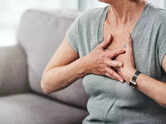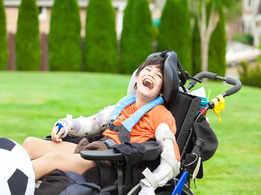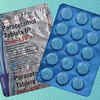01/7Latest COVID symptoms

With the new Omicron variant and sub variants, COVID cases are rising everyday in India.
Apart from the commonly reported symptoms, this time, doctors have noticed that several patients are presenting more non-specific symptoms, including diarrhoea, decreased urine output and chest pain. The scary part is that this chest pain could be a sign of heart attack risk.
"The number of acute coronary syndrome, myocardial infarction (heart attack) is increasing in COVID positive patients. There are patients who report non-specific symptoms like chest pain, decreased urine output, diarrhoea and then turn out to be COVID positive," Akshay Budhraja, senior consultant, respiratory and sleep medicine at Aakash Healthcare, told IANS.
02/7Other current COVID symptoms


Apart from the above mentioned signs, doctors share that the current COVID patients are commonly complaining of the following symptoms:
- Giddiness
- Extreme weakness
- Temporary loss of smell and taste
- Fever or chills
- Cough
- Shortness of breath or difficulty breathing
- Fatigue
- Muscle or body aches
- Headache
- Sore throat
- Congestion or runny nose
- Nausea or vomiting
03/7About new Omicron sub-variant BA 2.75


Omicron's sub-variant BA 2.75 -- known to have a higher transmission rate – has recently been detected in Delhi. The new Omicron sub-variant was detected in the study of 90 samples sent for genome sequencing at Lok Nayak Jai Prakash Narayan Hospital in Delhi.
World Health Organization's chief scientist Soumya Swaminathan said that BA.2.75 appeared to have mutated in a way that could indicate "major immune escape". This new sub-variant can infect people who already have antibodies from previous vaccination.
04/7Less severe infection


The good news is that even though Omicron BA.2.75 is causing another surge in infections, most cases so far show that this variant is not dangerous. Swaminathan noted that it showed a "clear growth advantage" over other variants in India, yet "it is too early to know that this sub-variant has properties of being more clinically severe".
Doctors also noted that the current recovery period for most patients is around a week.
05/7COVID appropriate behaviour


- Maintain a safe distance from others, even if they are not sick.
- Wear masks in public spaces, especially when physical distancing is not possible.
- Avoid crowded places if possible.
- Open a window when indoors.
- Clean your hands often using soap and water, or an alcohol-based sanitiser.
- Get vaccinated timely.
- Stay home if you feel unwell and do not come in contact with others.
- Contact your doctor if you experience any symptoms.
Read more: Signs of vulvar cancer that may be misdiagnosed as UTI or yeast infection
06/7Status of COVID in India


On Thursday, India reported a total of 15,754 new Coronavirus cases, increasing the total figure to 4,43,14,618.
The death count has increased to 5,27,253 with 39 more deaths in the last 24 hours, according to the health ministry. According to data, the active cases stand at 1,01,830 and the number of people who have recovered from the disease has increased to 4,36,85,535.
07/7COVID treatment at home


Follow these self-care steps in case of asymptomatic or mild COVID-19 cases:
- Isolate at home in a well ventilated room.
- Take rest and drink lots of fluids to stay hydrated.
- Wash your hands frequently with soap and water.
- Don’t share your personal items with other people in the house.
- Monitor your temperature daily.
- Connect with your doctor immediately if any symptoms worsen.























































































closecomments
SIGN IN WITH
FacebookGoogleEmail